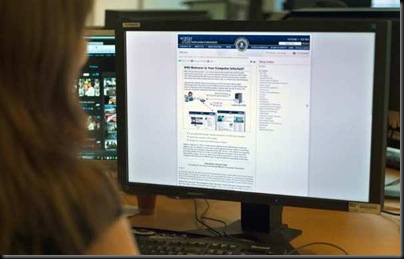The obscure U.N. agency is mulling rules that could have profound, detrimental effects on the Internet.

A woman looks at the FBI site page dedicated to the DSN Malware in Paris. Cyber crime is a significant global problem, but some of the measures suggested to address it look more like tools for surveillance and repression than self-defense. (Michel Rubinel / AFP / Getty Images / July 9, 2012)
July 22, 2012
Pushed by various countries and interest groups, the International Telecommunications Union — an obscure United Nations agency that develops voluntary standards for international phone networks and communications satellites — is mulling whether to adopt new rules that could have a profound and detrimental effect on the Internet. Although the ITU's negotiations are secret, it's clear that some telecommunications companies are trying to persuade the agency to let them extract a larger share of the revenue generated online. And some governments are calling for regulations that would make it easier to identify and monitor their opponents. The ITU shouldn't serve any such agendas.
At issue is the ITU's effort to update an international telecommunications treaty last negotiated in 1988, before the Internet became the backbone of global electronic communications and commerce. The more than 190 countries and 700 industry and academic groups that are members of the ITU have until next month to submit proposals for the new draft of the treaty, which the ITU is expected to complete in December. It would then go to the member nations for ratification.
One proposal from a group of European telecom companies would extend to the Internet a practice that is common in the phone business: The entity that sends traffic across an international border pays the network that receives it. Such a change would allow Internet service providers in one country to extract fees from popular websites in other countries for the right to connect to their customers. But sites may respond by abandoning large parts of the developing world where the audience isn't large enough to justify the added cost. That's the opposite of what the ITU should be seeking to accomplish.
Other proposals advanced by the likes of Russia and China would have the ITU take a more active role in cyber security. Cyber crime is a significant global problem, but some of the measures suggested to address it — such as enabling telecom companies (and, by extension, governments) to identify the source of every bit of data reaching their networks — look more like tools for surveillance and repression than self-defense.
In short, what's happening at the ITU seems less about assuring the functionality of the Internet than about redividing the spoils and limiting the Web's power to disrupt established regimes. There also seems to be some geopolitical score-settling, as countries in the developing world seek to reduce what they see as the United States' disproportionate influence over the Internet. Those forces, however, have different interests from the public, which has been well served by a free Internet whose technical issues have been left to nongovernmental groups to manage. The secretive ITU is the wrong place to address the complaints of governments and industries that see an open Internet as a threat, not an opportunity.
Read more:
http://www.latimes.com/news/opinion/editorials/la-ed-internet-un-itu-20120722,0,335845.story
